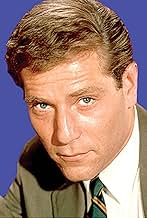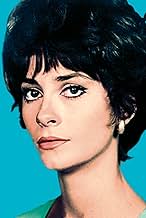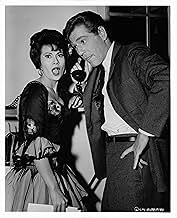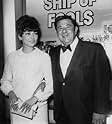NOTE IMDb
7,0/10
7,4 k
MA NOTE
Un groupe hétéroclite de passagers à bord d'un paquebot en route pour l'Allemagne d'après-guerre incarne un microcosme de la société des années 1930.Un groupe hétéroclite de passagers à bord d'un paquebot en route pour l'Allemagne d'après-guerre incarne un microcosme de la société des années 1930.Un groupe hétéroclite de passagers à bord d'un paquebot en route pour l'Allemagne d'après-guerre incarne un microcosme de la société des années 1930.
- Réalisation
- Scénario
- Casting principal
- Récompensé par 2 Oscars
- 5 victoires et 13 nominations au total
José Ferrer
- Siegfried Rieber
- (as Jose Ferrer)
José Greco
- Pepe
- (as Jose Greco)
Heinz Rühmann
- Julius Löwenthal
- (as Heinz Ruehmann)
Avis à la une
"Ship Of Fools" (1965) movie is better than K. A. Porter's book, and possibly the best ensemble top actors movie ever made.
The movie got two Academy Awards....one for best cinematography, and the other for best art direction. Both deserved.
"Ship Of Fools" (1965) also deserved (but did not get, sadly) multiple "Best Actor" and Best Actress" awards ["Best Supporting Actor/ Actress awards, also].
High quality, in-depth acting of true talent and accomplishment have seldom ever reached the levels achieved in this movie, done repeatedly, again and again and again, from start to finish.
The movie contained at least half a dozen (possibly more) Academy Award winner best actor performances.....at least three best actor academy award winners performed (incredibily) in this movie (Lee Marvin, Vivien Leigh, and Jose Ferrer), and others (some who may have gotten academy awards I overlooked) were also wonderful in all ways (Simone Signoret, Oscar Werner, Michael Dunn, Elizabeth Ashley, George Segal, Gila Golan, Jose Greco, and Barbara Luna....who sang the famous "Dites Moi" song in South Pacific on the Broadway stage when she was a little girl in 1949!).
The titles at the start of movie are incredible, and deserve to be ranked with the best of all movie titles ever presented (someday, a special award for movie titles will be established....if this has not already been done, it is certainly an unmet need.....movie titles are important, are an art unto themselves, and a major asset to movies when done well.........see the titles for Bullitt 1968 and North By Northwest 1959 as only two examples of "the best of the best movie titles...the "Ship Of Fools" 1965 movie titles are part of the "the best of the best.") The Abby Mann written screenplay is really an original screenplay with an original story, by far better than the best selling Katherine Anne Porter novel also titled "Ship Of Fools" .... not at all the same as the book....better! Stanley Kramer's direction is wonderful.
Original music by Ernest Gold in the movie includes a German language song performed very well by Jose Ferrer. The title of the song is "Heute abend geh'n wir bummein auf der Reeperbahn," and it is a true "gemutlicheit" German language song, indeed, even if it was written in the USA for a Hollywood, English language movie.
This movie is a true gem, and deserves to be ranked as one of the best movies of all times.
All movie actors (I am one) should see this movie....it's a chance to see "the best of the best" one after the other after the other after the other.
Acting just doesn't get better than is the case in "Ship Of Fools" (1965).
-------------- Written by Tex Allen, SAG Actor Email Tex Allen at TexAllen@Rocketmail.Com Visit WWW.IMDb.Me/TexAllen for movie credits and biography information.
The movie got two Academy Awards....one for best cinematography, and the other for best art direction. Both deserved.
"Ship Of Fools" (1965) also deserved (but did not get, sadly) multiple "Best Actor" and Best Actress" awards ["Best Supporting Actor/ Actress awards, also].
High quality, in-depth acting of true talent and accomplishment have seldom ever reached the levels achieved in this movie, done repeatedly, again and again and again, from start to finish.
The movie contained at least half a dozen (possibly more) Academy Award winner best actor performances.....at least three best actor academy award winners performed (incredibily) in this movie (Lee Marvin, Vivien Leigh, and Jose Ferrer), and others (some who may have gotten academy awards I overlooked) were also wonderful in all ways (Simone Signoret, Oscar Werner, Michael Dunn, Elizabeth Ashley, George Segal, Gila Golan, Jose Greco, and Barbara Luna....who sang the famous "Dites Moi" song in South Pacific on the Broadway stage when she was a little girl in 1949!).
The titles at the start of movie are incredible, and deserve to be ranked with the best of all movie titles ever presented (someday, a special award for movie titles will be established....if this has not already been done, it is certainly an unmet need.....movie titles are important, are an art unto themselves, and a major asset to movies when done well.........see the titles for Bullitt 1968 and North By Northwest 1959 as only two examples of "the best of the best movie titles...the "Ship Of Fools" 1965 movie titles are part of the "the best of the best.") The Abby Mann written screenplay is really an original screenplay with an original story, by far better than the best selling Katherine Anne Porter novel also titled "Ship Of Fools" .... not at all the same as the book....better! Stanley Kramer's direction is wonderful.
Original music by Ernest Gold in the movie includes a German language song performed very well by Jose Ferrer. The title of the song is "Heute abend geh'n wir bummein auf der Reeperbahn," and it is a true "gemutlicheit" German language song, indeed, even if it was written in the USA for a Hollywood, English language movie.
This movie is a true gem, and deserves to be ranked as one of the best movies of all times.
All movie actors (I am one) should see this movie....it's a chance to see "the best of the best" one after the other after the other after the other.
Acting just doesn't get better than is the case in "Ship Of Fools" (1965).
-------------- Written by Tex Allen, SAG Actor Email Tex Allen at TexAllen@Rocketmail.Com Visit WWW.IMDb.Me/TexAllen for movie credits and biography information.
Vivien Leigh sits opposite redneck Lee Marvin in the ship's upper deck restaurant, Marvin confesses to Leigh he never new what a Jew was until he was 15, "You were too busy lynching blacks" is her replay. I thought to mention it just to give you a hint of the sort of cruise ship we're travelling on. We sail through a sea that goes from the sublime to the ridiculous. Abby Mann is a master at drawing characters with long shadows and Kramer a master at capturing them. Think "Judgement at Neuremberg" Here you'll feel sea sick sometimes but the trip is worth taking. I mean. Vivien Leigh and Lee Marvin in a sad comedy of errors. Simone Signoret as a drug addicted countess and Oskar Werner her kindly, tragic, doctor, pusher. Highly charged, beautifully written moments. The lower decks for the down trodden is full of extras. George Segal and Elizabeth Ashley try both decks and and a deck all their own with melodramatic regularity. Jose Ferrer and Heinz Rhumman have one of my favourite exchanges. Ferrer, the German military tells Rhumman, the German Jew, that he should admit that the Jews are great part of the German problem. Rhumman calmly agrees and ads "true, but not only the Jews, also men who smoke the pipe are great part of the German problem" "Why men who smoke the pipe?" Shouts Ferrer. To what Rhumman replies "Why the Jews?" Michael Dunn addresses us directly, asking us to find ourselves among the passengers. Okay.
About 1490 or so a German writer named Sebastian Brandt wrote an allegorical novel about the condition of mankind and types of men in their follies called DER NARR SHIFF (I believe that is the German title) which translates to "The Ship of Fools". At that time in Europe many humanists wrote such allegories, the most famous one being Erasmus' IN PRAISE OF FOLLY. Today Erasmus is still remembered, while Brandt is studied only by students of the German language and it's literature.
The title SHIP OF FOOLS was picked up by Katherine Anne Porter, who (for most of her literary career) was an excellent short story writer. At the tail end of that career she decided to tackle the larger target of a complete, complex novel. As one can see from the comments on this thread some people think she did superbly with her story and characterizations, while others think she flubbed it. I've never read the novel, but judging from the film version (and suspecting it is a watered down treatment, like most novels into films) it must be an above average work.
To me this is a film that actually stands out for individual moments by the cast. Michael Dunn ferociously lecturing Heinz Ruhlmann about the extreme anti-Semitism of the other passengers (not only the irritating neo-Nazi Jose Ferrer, but most of the other passengers) that has caused them (Dunn and Ruhlmann) to be banished to an isolated table for their meals. Ruhlmann, a kindly, nice man (who manages to make Ferrer's bigotry seem funny and stupid at one point) responds, "There are one million Jews in Germany. Are they going to kill us all?" The dialog is fairly sharp in these vignettes. Werner Klemperer, as a ship's officer, responding from signals from Vivien Leigh for some type of shipboard sexual encounter, discovering that Leigh is simply using him for a matter of trivial amusement. He tells her off in a fine little speech, which may have been the best delivered dialog of his career on film (and is years away from his Col. Wilhelm Klinck on HOGAN'S HEROES). Ferrer is half gregarious and half a bigoted swine, and totally untrustworthy. In the coming war unlike Herr Schindler, if Ferrer made a list it would be to turn Jews over to the authorities so he could get their possessions. His comment about how he is not anti-Semitic, he adores Arab people is almost as good as his spirited moment of pure entertainment when he sings a comic German song for the passengers. Even the minor actors on the screen have good moments. Witness the now forgotten Henry Calvin (a few years earlier he had been one of the "Laurel & Hardy" imitations in Walt Disney's BABES IN TOYLAND). Here he is one of the Cuban peasants transported by the ship to pre-Civil War Spain. His moment is when he tells off the racist Captain and his officers who have looked down on these steerage passengers, referring to the Captain as a pig. One can keep going on, especially with the sympathetic Oscar Werner and Simone Signoret, and with Dunn again, the only one of the passengers and crew who is intelligent.
For the point of the story is that this world of the 1930s is headed (as the reader knows) for disaster that will engulf everyone. The café society will not survive it. The Cuban immigrants will soon be killed by Republican or Fascists in Spain. The Captain and his crew will be drafted into Hitler's navy, and probably die in the Bismarck or some other ship. Marvin will be drafted, and even if he should survive the war he will find the segregation of his United States slowly eroded in the decades following the war. Ferrer will probably be starving in the ruins of Dresden or Berlin (if he is not killed in a bombing), wondering what happened to that prosperity the Nazis promised in a world without Jews. Every character in the story is facing the conclusion of the standards that gave them some degree of stability - some like Vivien Leigh and Simone Signoret are already going to pieces. In some ways, at the end, Werner and Dunn may be the only lucky ones. Werner is lucky because he will die before the war comes. Dunn...well since he is the clearest in terms of reality of all the characters, he will probably leave Europe before 1939, settle in the U.S. sitting out the war there, and only return afterwards to gaze at the ruins the others wrought.
The title SHIP OF FOOLS was picked up by Katherine Anne Porter, who (for most of her literary career) was an excellent short story writer. At the tail end of that career she decided to tackle the larger target of a complete, complex novel. As one can see from the comments on this thread some people think she did superbly with her story and characterizations, while others think she flubbed it. I've never read the novel, but judging from the film version (and suspecting it is a watered down treatment, like most novels into films) it must be an above average work.
To me this is a film that actually stands out for individual moments by the cast. Michael Dunn ferociously lecturing Heinz Ruhlmann about the extreme anti-Semitism of the other passengers (not only the irritating neo-Nazi Jose Ferrer, but most of the other passengers) that has caused them (Dunn and Ruhlmann) to be banished to an isolated table for their meals. Ruhlmann, a kindly, nice man (who manages to make Ferrer's bigotry seem funny and stupid at one point) responds, "There are one million Jews in Germany. Are they going to kill us all?" The dialog is fairly sharp in these vignettes. Werner Klemperer, as a ship's officer, responding from signals from Vivien Leigh for some type of shipboard sexual encounter, discovering that Leigh is simply using him for a matter of trivial amusement. He tells her off in a fine little speech, which may have been the best delivered dialog of his career on film (and is years away from his Col. Wilhelm Klinck on HOGAN'S HEROES). Ferrer is half gregarious and half a bigoted swine, and totally untrustworthy. In the coming war unlike Herr Schindler, if Ferrer made a list it would be to turn Jews over to the authorities so he could get their possessions. His comment about how he is not anti-Semitic, he adores Arab people is almost as good as his spirited moment of pure entertainment when he sings a comic German song for the passengers. Even the minor actors on the screen have good moments. Witness the now forgotten Henry Calvin (a few years earlier he had been one of the "Laurel & Hardy" imitations in Walt Disney's BABES IN TOYLAND). Here he is one of the Cuban peasants transported by the ship to pre-Civil War Spain. His moment is when he tells off the racist Captain and his officers who have looked down on these steerage passengers, referring to the Captain as a pig. One can keep going on, especially with the sympathetic Oscar Werner and Simone Signoret, and with Dunn again, the only one of the passengers and crew who is intelligent.
For the point of the story is that this world of the 1930s is headed (as the reader knows) for disaster that will engulf everyone. The café society will not survive it. The Cuban immigrants will soon be killed by Republican or Fascists in Spain. The Captain and his crew will be drafted into Hitler's navy, and probably die in the Bismarck or some other ship. Marvin will be drafted, and even if he should survive the war he will find the segregation of his United States slowly eroded in the decades following the war. Ferrer will probably be starving in the ruins of Dresden or Berlin (if he is not killed in a bombing), wondering what happened to that prosperity the Nazis promised in a world without Jews. Every character in the story is facing the conclusion of the standards that gave them some degree of stability - some like Vivien Leigh and Simone Signoret are already going to pieces. In some ways, at the end, Werner and Dunn may be the only lucky ones. Werner is lucky because he will die before the war comes. Dunn...well since he is the clearest in terms of reality of all the characters, he will probably leave Europe before 1939, settle in the U.S. sitting out the war there, and only return afterwards to gaze at the ruins the others wrought.
A grim long voyage with an earnest script by the remarkable Abby Mann and a respectful Stanley Kramer at the helm. Assorted desperate characters makes the sailing a gripping one. When the extraordinary Simone Signoret, Oskar Werner and Vivien Leigh are on, we're there with them one hundred per cent. Simone Signoret's addicted Countess and Vivien Leigh's bitter and disillusioned middle age Southern woman touch and dominate the highest, most powerful moments. Their stories have an immediate resonance and their faces, wonderful, beautiful faces, carry a truth that is as pungent as it is undeniable. Painful yes, very painful but, as it happens with the best kind of drama, entertaining, compelling, cinematic. Jose Ferrer's German bore, George Segal and Elizabeth Ashley and even the wonderful Michael Dunn will make you sea sick at times but I will recommend it nonetheless just to admire and enjoy Vivien Leigh's Charleston or Simone Signoret looking at Oskar Werner with a mixture of love, lust, compassion and need. For collectors of imperfect gems.
"Ship of Fools" it may be, but it is also a Ship of Stars: Oskar Werner, Vivien Leigh, Lee Marvin, Simone Signoret, Jose Ferrer, Elizabeth Ashley, George Segal, and Michael Dunn. Directed by Stanley Kramer, this 1965 film deals with a German ship heading to its port in Bremerhaven in 1933 and the lives of some of its passengers. Dunn speaks to the audience at the beginning and end of the film, telling us at first that it is a ship of fools and that we may find ourselves in some of the characters.
This is one of the best all-star casts ever assembled, right up there with "All About Eve" and "The Long, Hot Summer." The performances are as magnificent as the film is relentlessly depressing, with a Jewish man put at a table with a dwarf, while at the captain's table, another man preaches about the new Germany and extermination of Jews, the elderly, and those who are not fit. The optimistic Jew thinks Germany owes the Jews a great deal and vice versa, and with 1 million Jews there, certainly no one is going to kill all of them. A drug-addicted woman is being deported to an island, and the very ill ship's doctor falls in love with her and is tempted to give up his miserable life to care for her. A couple with a passionate sex life finds they are poles apart in every other way. A bitter, middle-aged woman comes to grips with her loneliness and tries to drink it away. And on and on, on the ship of fools. By the end of the film, looking at the Jew's beautiful family on the dock, the viewer is ready to reach for a razor blade.
Oskar Werner (Tyrone Power's son-in-law) gives a magnificent performance as a man discouraged about his life full of obligations, exhausted from ill health, and reaching out for one last chance at happiness. Simone Signoret, who falls for the doctor, is a warm and sympathetic countess, nervous about her future, her past dried up. Lee Marvin, as a southern drunk who wants to get laid, is perfection - Vivien Leigh herself was impressed with him. "What's this about the Jews?" he asks her. "I never saw a Jew until I was 15." "Perhaps you were too busy lynching Negroes to care about the Jews," she replies.
For Vivien Leigh, Scarlett is far behind her - 26 years behind her, in fact, with almost no vestige of her left due to Leigh's battles with manic-depression and the dissolution of her marriage to Laurence Olivier. As Scarlett herself would have said, "That girl doesn't exist anymore." Her character is the Blanche Dubois who didn't go to the asylum and some years later takes a cruise. Even the last gown she wears, as she dances the Charleston, is reminiscent of Blanche. It's a great performance as a beautiful woman who has seen better days and is disillusioned and bitter about men, love, and romance. Her big scenes at the end of the film - in the hallway and with Marvin - are fantastic.
I have to believe, though "Ship of Fools" is downbeat, that it leaves us with some hope. Dunn, as the dwarf philosopher, is too smart to stick around Germany once things heat up; perhaps his Jewish friend will see the light before it's too late. The Countess is a survivor; no reason she shouldn't survive the island. But for all of them, a certain way of life has ended, and they won't be going back.
One of the great films of the '60s.
This is one of the best all-star casts ever assembled, right up there with "All About Eve" and "The Long, Hot Summer." The performances are as magnificent as the film is relentlessly depressing, with a Jewish man put at a table with a dwarf, while at the captain's table, another man preaches about the new Germany and extermination of Jews, the elderly, and those who are not fit. The optimistic Jew thinks Germany owes the Jews a great deal and vice versa, and with 1 million Jews there, certainly no one is going to kill all of them. A drug-addicted woman is being deported to an island, and the very ill ship's doctor falls in love with her and is tempted to give up his miserable life to care for her. A couple with a passionate sex life finds they are poles apart in every other way. A bitter, middle-aged woman comes to grips with her loneliness and tries to drink it away. And on and on, on the ship of fools. By the end of the film, looking at the Jew's beautiful family on the dock, the viewer is ready to reach for a razor blade.
Oskar Werner (Tyrone Power's son-in-law) gives a magnificent performance as a man discouraged about his life full of obligations, exhausted from ill health, and reaching out for one last chance at happiness. Simone Signoret, who falls for the doctor, is a warm and sympathetic countess, nervous about her future, her past dried up. Lee Marvin, as a southern drunk who wants to get laid, is perfection - Vivien Leigh herself was impressed with him. "What's this about the Jews?" he asks her. "I never saw a Jew until I was 15." "Perhaps you were too busy lynching Negroes to care about the Jews," she replies.
For Vivien Leigh, Scarlett is far behind her - 26 years behind her, in fact, with almost no vestige of her left due to Leigh's battles with manic-depression and the dissolution of her marriage to Laurence Olivier. As Scarlett herself would have said, "That girl doesn't exist anymore." Her character is the Blanche Dubois who didn't go to the asylum and some years later takes a cruise. Even the last gown she wears, as she dances the Charleston, is reminiscent of Blanche. It's a great performance as a beautiful woman who has seen better days and is disillusioned and bitter about men, love, and romance. Her big scenes at the end of the film - in the hallway and with Marvin - are fantastic.
I have to believe, though "Ship of Fools" is downbeat, that it leaves us with some hope. Dunn, as the dwarf philosopher, is too smart to stick around Germany once things heat up; perhaps his Jewish friend will see the light before it's too late. The Countess is a survivor; no reason she shouldn't survive the island. But for all of them, a certain way of life has ended, and they won't be going back.
One of the great films of the '60s.
Le saviez-vous
- AnecdotesVivien Leigh was subject to bouts of depression and alcoholism and was abrasive to fellow actors. There was a rocky start to her relationship with Lee Marvin, complaining about his stale alcohol breath. Eventually, the two became highly unlikely good friends.
- GaffesAlthough set in 1933, the hairstyles and costumes are decidedly mid-1960s.
- ConnexionsEdited into Spisok korabley (2008)
Meilleurs choix
Connectez-vous pour évaluer et suivre la liste de favoris afin de recevoir des recommandations personnalisées
- How long is Ship of Fools?Alimenté par Alexa
Détails
Box-office
- Budget
- 4 000 000 $US (estimé)
- Montant brut mondial
- 206 $US
- Durée2 heures 29 minutes
- Couleur
- Mixage
- Rapport de forme
- 1.85 : 1
Contribuer à cette page
Suggérer une modification ou ajouter du contenu manquant

Lacune principale
By what name was La nef des fous (1965) officially released in India in English?
Répondre







































